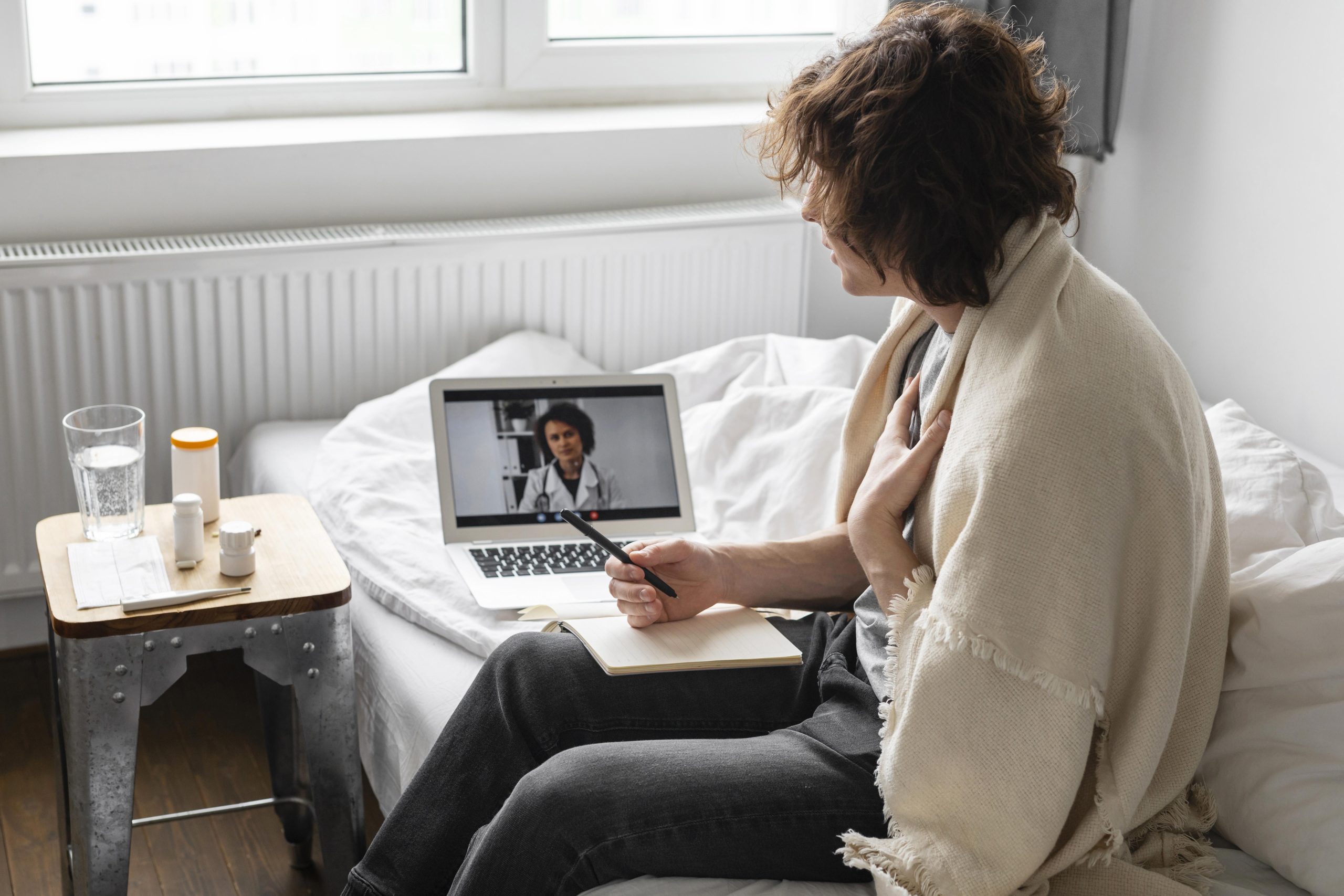Overcoming addiction is a deeply personal journey that requires commitment, professional guidance, and a strong support system. Traditionally, addiction recovery meant attending in-person therapy sessions, rehab programs, and group meetings. However, in recent years, telehealth addiction treatment has revolutionized the way individuals receive care.
With the rise of online addiction programs in Miami and across the country, more people are turning to telehealth for substance abuse treatment. Virtual counseling, medication-assisted treatment (MAT), and remote support groups are making addiction recovery via telehealth more accessible and effective than ever before.
If you or a loved one is struggling with substance abuse, understanding how telehealth can help may be the first step toward lasting recovery. This blog explores the benefits, challenges, and future of telehealth addiction treatment, ensuring you have the knowledge to make an informed decision.
Understanding Telehealth Addiction Treatment
More and more individuals are choosing telehealth for substance abuse recovery, but what exactly does it involve?
What is Telehealth?
Telehealth refers to the delivery of healthcare services through digital communication tools, such as video calls, phone consultations, mobile apps, and online platforms. It enables individuals to connect with healthcare professionals remotely, eliminating the need for in-person visits.
When applied to addiction recovery, telehealth for substance abuse offers patients access to therapy, counseling, support groups, and medication-assisted treatment from anywhere. Whether through virtual one-on-one counseling, online 12-step meetings, or digital recovery tools, telehealth makes treatment more accessible and adaptable to different lifestyles.
Why Telehealth for Addiction Recovery?
Traditionally, addiction recovery required individuals to attend rehab centers, outpatient clinics, or in-person therapy sessions. While these methods remain effective, they can be inconvenient, expensive, or inaccessible for some people.
Telehealth addiction treatment bridges this gap by offering remote, flexible, and private treatment options that fit the needs of modern patients. It is particularly beneficial for:
Individuals with busy schedules who cannot commit to traditional rehab.
People living in rural or underserved areas without easy access to treatment centers.
Those who prefer private, confidential care from the comfort of their home.
Patients with mobility limitations or transportation challenges.
Individuals in early recovery who need continuous virtual support.
By eliminating the barriers associated with in-person treatment, addiction recovery via telehealth ensures more people can access care when they need it most.
How Telehealth Is Reshaping Addiction Recovery
With new technology, addiction treatment is more flexible, accessible, and personalized than ever before. Whether through virtual counseling, online support groups, or digital relapse prevention tools, telehealth is reshaping the future of addiction recovery.
1. Virtual Counseling and Therapy
One of the core components of addiction treatment is therapy, which helps individuals understand their triggers, behaviors, and coping strategies. Telehealth makes therapy more accessible by offering:
Individual therapy – One-on-one virtual counseling with an addiction specialist.
Group therapy – Online support groups for shared experiences and encouragement.
Family counseling – Helping families navigate the recovery journey together.
Cognitive Behavioral Therapy (CBT) and Motivational Interviewing (MI) are commonly used in telehealth therapy to address negative thought patterns, motivation, and relapse prevention.
2. Online Support Groups and Peer Networks
Support groups play a crucial role in addiction recovery by providing encouragement, accountability, and shared experiences. Many online addiction programs in Miami and across the U.S. offer:
Virtual 12-step meetings (e.g., Alcoholics Anonymous, Narcotics Anonymous).
Online peer-led recovery groups for support between therapy sessions.
Community forums and discussion boards for ongoing engagement.
Being able to connect with a support network anytime, anywhere, significantly improves recovery outcomes.
3. Medication-Assisted Treatment (MAT) via Telehealth
For those struggling with opioid, alcohol, or nicotine addiction, medication-assisted treatment (MAT) can be a critical part of recovery. Through telehealth, patients can:
- Have virtual consultations with doctors to assess their treatment needs.
- Receive prescriptions for FDA-approved medications such as buprenorphine, methadone, or naltrexone.
- Monitor progress through digital health tracking and routine virtual check-ins.
This ensures safe and effective medication management without requiring frequent in-person visits.
4. Digital Recovery Tools and Mobile Apps
Many addiction recovery programs via telehealth include smartphone apps and online tools to help individuals track progress and maintain sobriety. These may include:
- Recovery tracking apps to log moods, cravings, and milestones.
- AI-powered chatbots offering instant emotional support.
- Reminders for therapy sessions, medication, and self-care.
- Daily motivation and mindfulness exercises to strengthen mental resilience.
These tools make self-monitoring and relapse prevention easier for individuals in recovery.
Benefits of Telehealth for Substance Abuse Recovery

Why are so many people turning to telehealth addiction treatment? It offers a range of benefits that make recovery more accessible, affordable, and effective.
1. Accessibility to Treatment
One of the biggest challenges in addiction recovery is getting access to timely care. Telehealth eliminates obstacles such as:
Long wait times for in-person therapy.
Difficulty finding transportation to a rehab center.
Limited availability of specialists in certain areas.
Instead, patients can access care from anywhere, making it easier to start and stay in treatment.
2. Flexibility and Convenience
Traditional rehab requires fixed schedules that may not work for working professionals, parents, or students. Telehealth addiction treatment offers flexible appointment times, allowing individuals to:
Attend therapy without missing work or family responsibilities.
Choose convenient time slots that fit their lifestyle.
Receive support when they need it most—even during late hours.
This flexibility leads to higher engagement and long-term recovery success.
3. Privacy and Reduced Stigma
Many individuals hesitate to seek addiction treatment due to fear of judgment. Telehealth provides a discreet, confidential environment where patients can:
- Access therapy from the privacy of their home.
- Avoid the stigma of visiting a rehab center.
- Engage in treatment anonymously, if preferred.
For those worried about social perception, online addiction programs in Miami and other regions allow for complete confidentiality.
4. Cost-Effectiveness
Telehealth is often more affordable than traditional rehab because it eliminates costs associated with travel, facility stays, and missed work days. Many insurance plans now cover telehealth addiction treatment, making it a budget-friendly alternative.
Challenges and Limitations of Telehealth in Addiction Recovery
While telehealth has transformed addiction treatment, it is not a one-size-fits-all solution. Some individuals may still require in-person care, and certain challenges must be addressed to maximize its effectiveness. Here are some limitations:
- Lack of in-person connection – Some individuals benefit from face-to-face interaction in therapy.
- Technology barriers – Not everyone has access to a stable internet connection or digital devices.
- Not suitable for severe cases – Individuals requiring medical detox or inpatient rehab may need in-person care.
Despite these challenges, telehealth remains a valuable option for many seeking addiction recovery.
Is Telehealth the Future of Addiction Recovery?
The rise of telehealth for substance abuse suggests that virtual care will continue to play a major role in addiction treatment. As technology advances, we can expect:
- More sophisticated digital tools for relapse prevention.
- AI-driven virtual counseling to provide real-time support.
- Expanded access to medication-assisted treatment (MAT).
Telehealth addiction treatment is not just a temporary solution—it’s shaping the future of addiction recovery.
Final Thoughts
If you or a loved one is struggling with substance abuse, addiction recovery via telehealth offers a convenient, private, and effective way to start healing. With online addiction programs in Miami and across the country, help is just a click away.
Ready to take the first step? Explore telehealth addiction treatment options today and reclaim your life. Book an appointment with Improving Lives Now!
Frequently Asked Questions
1. Is telehealth addiction treatment as effective as in-person rehab?
Yes, telehealth can be just as effective for many people, especially for therapy, counseling, and medication-assisted treatment (MAT). However, severe cases requiring detox or inpatient care may still need in-person treatment.
2. What types of addiction can be treated through telehealth?
Telehealth can help with alcohol, opioid, stimulant, marijuana, nicotine, and prescription drug addiction. However, those with severe withdrawal symptoms may need in-person medical care first.
3. How can I access telehealth for substance abuse treatment?
Find a licensed telehealth addiction program, check insurance coverage, schedule a virtual consultation, and use digital tools like therapy sessions and support groups.
4. Is telehealth addiction treatment covered by insurance?
Many insurance plans cover telehealth addiction treatment, but coverage varies. Check with your provider or the treatment program to confirm what’s included.


